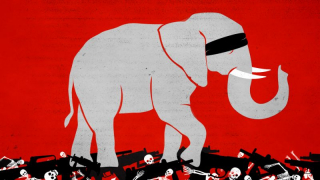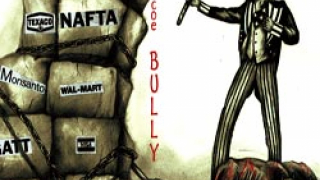The New Inquisitions
“While journalist police try to replace engaged intellectuals, the hunt for the heretic, on the basis of absolute media consensus, has been substituted for critical discussion and polemical argumentation. Mild and diluted defamation, righteous denunciation, mimetic bien-pensante informing, give the witch hunt a French style. The taste for informing spreads in the editorial boards: they prepare a list of suspects, they take inventory of the “ambiguous” and the “equivocal” (the “not clear”), they work to monitor nearly all deficiencies of ideological “correctness” […]. The heretic hunter doesn't inquire, he doesn't discuss, he denounces, he tracks, he puts away those he designates as criminals and enemies, even absolute enemies.”
Pierre-André Taguieff wrote that in September 1998, in Le Figaro. Have things changed since? One really doesn't have that impression if we judge by the words or expressions that ceaselessly recur in the media like refrains: thought police, sanitary cordon, hygienic thought, demonization, intellectual Stalinism, anachronistic antifascism, manichaeism, informerism, witch hunt, hysteric stigmatization, manipulation of suspicion, dictatorship of bien-pensance, summary execution, marginalization, slip-ups, dangerous thoughts, conflations, reductio ad hitlerum, decontextualization, militant reading, uncrossable red line, anathemas, lead blankets, hypermoralism, ethnic purification, lexical phobia, opinions unworthy of opinion, pariah thoughts, etc. In the 1970s, we often spoke of “intellectual terrorism,” in the 1980s of “thought police,” since the 2000s of “pensée unique” [translator's note 1]. But it's still the same phenomenon: the de facto proscription of non-conformist ideas, the marginalization of those who situate themselves outside virtuous circle of the dominant doxa [translator's note 2].
Let's be clear: there has always been censorship, discourses that were more easily accepted than others, and others that they wanted to see disappear. No sector of opinion, no ideology, no family of thought has escaped it in the course of history, and quite often, those who complain the most about censorship only dream of being able to implement it in turn. However the fact remains that censorship and inquisitions have taken new forms for the past few decades.
There are three radically new factors to recognize.
Moral order and the empire of the Good
The first is that censors today want to have a good conscience, which was not necessarily the case in the past. Those who are employed to marginalize, ostracize, reduce to silence want to have the sentiment of being situated on the side of the Good. The new moral order today conflates itself with what Philippe Muray called the empire of the Good [1], an evolution inseparable from the appearance of a new form of morality that ends up invading everything.
The old morality prescribed individual rules of behavior: society was supposed to function better if the individuals who composed it acted so. The new morality wants to moralize society itself, without imposing rules on individuals. The old morality told people what they must do, the new morality describes what society must become. It's not longer individuals who must behave better, but society that must be rendered more “just.” The old morality was ruled by the good, while the new is ruled by the just. The good asserts the ethic of virtues, the just a conception of “justice” itself colored with a strong moral impregnation. Founded on subjective rights that individuals would draw from the state of nature, the ideology of human rights, having become the civil religion of our time, is before all a moral doctrine too. Modern societies are both ultrapermissive and hyper-moral.
We know the old debate regarding law and mores: is it the law that causes mores to evolve or mores that cause the law to evolve? In order to respond to the question, it suffices to note the evolution of the status attributed to homosexuality in the public space. If fifty years ago, “apology for homosexuality” was punished by law, today it's “homophobia” that can be the object of penal sanction, to such a point that, in the schools, they henceforth organize campaigns aiming to “heighten children's awareness of homophobia.” Whatever opinion one could have on homosexuality, the comparison of these two facts has something astonishing. In a half-century, homosexuality was presented in a rather derisive fashion as “shameful” or “abnormal,” today it has become so admirable that it is forbidden to say that one doesn't appreciate it.
The fury of the Good evidently doesn't spare history. “Memorial laws”, regardless of whether they create new penal offenses or not, whether they are repressive or purely proclamatory, suggest that the law is capable of deciding historical truth, which is an aberration. They foster public “repentances” which, by encouraging one to only remember the past as a crime, also function as retroactive warnings and incapacitating myths. In the empire of the Good, one no longer seeks to refute inconvenient thoughts, but to delegitimize them – not as false, but as evil.
The ideology of rights and political correctness
The second key factor: the emergence of “political correctness.” This tidal wave, coming from the other side of the Atlantic, is not anecdotal – much to the contrary. It's indirectly an offshoot of the ideology of rights, starting with the right to have rights. From the start, there are claims impacting vocabulary or formulations: those who feel shocked, humiliated, denigrated by the usage of certain terms, regularly presented as stereotypes, claim to be justified in demanding that we suppress them. Neofeminist movements and the proponents of “gender theory” are at the forefront of this claim, which could be legitimate if it wasn't pushed to absurdity.
The deep cause of political correctness actually resides in what one could call the metaphysics of subjectivity, which is one of the keystones of modernity. Descartes is its great ancestor: “I think, therefore I am.” I, I. In more contemporary terms: me, me. The truth is no longer external to myself, it is conflated with it. Society must respect me, it must ban anything that could offend me, humiliate me, shock or bruise my ego. Others must not decide for me what I am, except to make me a victim. Apparently, I am a white man with a thick beard, but if I decided that I am a transitioning black lesbian, that's what one must consider me. I was born sixty years ago, but if I attribute myself the characteristics of a 40 year old man, that's how the civil state should register me. Basically, I alone have the right to speak for myself. Thus the narcissism of resentment feeds itself.
Censorship in our day thus justifies itself by the “right of minorities to not be offended.” These minorities are not communities or bodies constituted in the traditional sense of the term, but dislocated groups of individuals who, in the name of a supposed origin or sexual orientation of the moment, seek to disarm any critic on the sole basis of their allergy to “stigmatization.” Their strategy is summarized in three words: bewilder, blame, impose. And in order to do that, pose as victims. In the compassionate climate of the empire of the Good, everyone wants to be a victim: the era of victims has replaced that of heroes. The status of victim authorizes anything, as soon as one can instrumentalize political correctness and the ideology of “human” rights. Structural racism, unconscious sexism, homophobia, it's a triple win. It's not longer essence, but grievance that precedes existence. The wailing wall extended to society as a whole in the name of the right to eradicate “discrimination.”
We can also pause on this term “discrimination,” because of the semantic misuse it is constantly the object of. Originally, the world actually had no pejorative character: it only designated the act of distinguishing or discerning. In contemporary language, it has come to designate an unjust and arbitrary differentiation, eventually carrying “incitation to hatred,” to such a point that the “fight against discrimination” has become one of the priorities of public action.
The problem is that this requirement, extending itself step by step, concludes in situations that, failing to be comical, are properly terrorizing. An American high school decided to eliminate a large mural dating from 1936 denouncing slavery, for the double reason that its creator was white (a White cannot be anti-racist, it's in his genes) and that his vision was “humiliating” for African-American students. It will be replaced by a fresco celebrating “the heroism of racial minorities in America.” In France, a performance of Aeschylus' The Suppliants at the Sorbonne caused “scandal” because certain actors wore black masks, evident proof of “racialism.” In Spain, a collective demanded the urgent regulation of “rape culture” that reigns in barnyards: hens are victims of the cocks' concupiscence. Others are outraged that people desire to render “hommage” to a famous woman (they must render her “femmage”) [translator's note 3], or that a minister accused in a recent affair has been deemed “blanchi” [translator's note 4], which attests lack of respect he has for people of color! One could cite hundreds of other examples.
In passing we note that the “racialization” of social relations we are presently witnessing hasn't failed to aggravate things, under the influence of “indigenist” and post-colonial movements. Which testifies to a certain irony: since we've officially declared that “race doesn't exist” we haven't stopped talking about it!
Media censorship instead of state censorship
The third new fact is that censorship is no longer principally done by public powers, but big media. In the past, the demands for censorship principally emanated from the state, the press flattered itself to play the role of counter-power. All that has changed. Not only has the media nearly abandoned any tendency to resist the dominant ideology, but it is its principal vector.
Newspapers, televisions, political parties: for thirty years, all say more or less the same thing because they all reason within the same circle of thought. Pensée unique is all the more omnipresent in the media as it exercises itself within a small circle where everybody has the same references (economic values and “human rights”), where everyone is familiar with each other and calls each other by their first name, where the same incestuous relationships unite journalists, politicians, and show-business. Its proof is that, on a certain number of key issues, 80% of them think exactly the opposite of what 80% of French people think. The result is that the media system is increasingly discredited. And the majority of debates we witness no longer deserve this name. Philippe Muray already said, “The field of what is no longer debatable never ceases to expand.” Frédéric Taddeï confirmed on France Inter in September 2018, “the problem is that you no longer have real debate on French television and that doesn't seem to bother any journalist.” Likewise, according to the fortunate expression of Jean-Pierre Garnier and Louis Janover, the engaged intellectual has ceded his place to the intellectual for hire: “The 'three Cs' that defined his mission in the past – critique, contest, combat – have been replaced with the 'three As' that summarize his resignation today: accept, approve, applaud [2].”
We are at the point where we are even going back to hunting colleagues. Journalists demand the silencing of other journalists, writers demand the censorship of other writers. We already saw that in the case of Richard Millet, and more recently Eric Zemmour. This is explicitly the program of two little inquisitors among others, Geoffroy de Lagasnerie and Édouard Louis: “Refuse to treat certain ideologues as interlocutors, certain themes as debatable, certain themes as relevant” (sic) [3]. To dialogue with the “enemy” would actually recognize his status of existence. It would be to expose oneself to soiling, contamination. One doesn't dialogue with the Devil. So we must demonize. Political correctness is the direct heir of the Inquisition, which sought to fight against heresy by detecting evil thoughts. In George Orwell's 1984, Syme explains quite well that the goal of newspeak is to “restrict the limits of thought.” “In the end we shall make thoughtcrime impossible, because there will be no words to express it.” That is the ultimate object of the new Inquisitions.
[1]Philippe Murray, l’Empire du Bien, les Belles Lettres, 2010.
[2]Jean-Pierre Garnier et Louis Janover, la Pensée aveugle. Quand les intellectuels ont des visions, Spengler, 1993.
[3]« Intellectuels de gauche, réengagez-vous ! », le Monde, 25 septembre 2015.
Translated from French by Eugene Montsalvat.
Translator's Notes:
1) The original French term « pensée unique » is difficult to translate exactly, under the rule of « pensée unique » everyone must think the same. « Pensée unique » can be compared to « monnaie unique », « marché unique », « Dieu unique », etc. It is a mix of political correctness and Orwellian “newspeak”: what everybody is supposed to think must conform to the dominant ideology.
2) Doxa is classical Greek term used to denote commonly accepted beliefs and opinions.
3) This plays on the French words for man, homme, and woman, femme.
4) Blanchir means to exonerate from wrongdoing.














